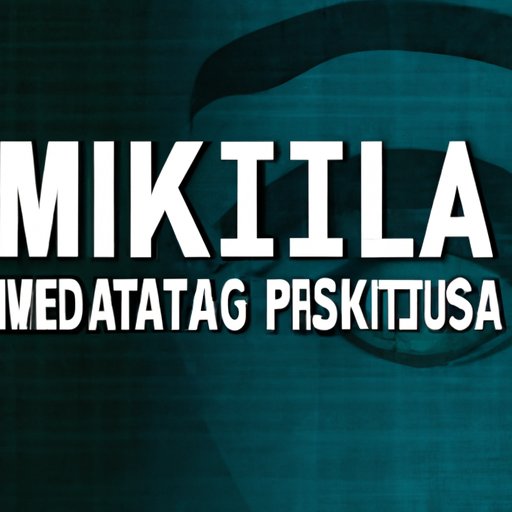I. Introduction
Have you ever heard of MKULTRA? This mysterious acronym refers to a CIA program that conducted experiments on mind control and drug testing during the Cold War, and its history remains a source of controversy and fascination to this day. In this article, we will explore the dark history of MKULTRA, examine its lasting impact on society, and discuss the ethical debates it has ignited surrounding research and experimentation practices. By the end of this article, you will have a better understanding of not only what MKULTRA was, but why it continues to be relevant today.
II. A brief history of MKULTRA
MKULTRA was a CIA program that was created in the early 1950s with the goal of developing techniques for mind control and chemical interrogation. The context of this program was the Cold War era, when the US government was seeking ways to gain an edge over the Soviet Union in terms of intelligence gathering and espionage. The program involved a series of experiments and research projects that were aimed at understanding the effects of drugs, psychological manipulation, and other techniques on individuals.
Some of the experiments under MKULTRA were highly controversial and included the use of LSD, hypnosis, sensory deprivation, and electroconvulsive therapy. The program was also involved in testing drugs like heroin, cocaine, and marijuana on unsuspecting individuals, including prisoners and military personnel. The extent of the experimentation and research under MKULTRA remains unknown, as much of the documentation surrounding the program was destroyed. However, we do know that these experiments were conducted on thousands of people without their knowledge or consent.
III. The effects of MKULTRA on society and its lasting impact
The experiments and research conducted under MKULTRA had a profound impact on the individuals and groups directly involved. Many suffered from lasting physical and mental health problems as a result of the experiments, and some even died. The program also eroded public trust in the government and medical research, as people became aware of the unethical experimentation being conducted in secret.
The broader impact of MKULTRA on society has been significant as well. The program helped fuel a counterculture movement in the 1960s that challenged authority and sought to reform institutions. It also contributed to a greater skepticism of medical research and government institutions, which can still be seen today in certain segments of the population.
IV. The controversy surrounding the MKULTRA experiments and their ethics
The experiments conducted under MKULTRA raised a number of ethical concerns, many of which remain unresolved today. One of the key issues is the lack of informed consent, as many of the subjects were not fully informed about the nature of the experiments they were undergoing. Additionally, the use of vulnerable populations, such as prisoners and the mentally ill, raises questions about whether the experiments were conducted on people who were capable of giving informed consent.
At the time, these concerns were not addressed by the government or other institutions involved in the program. Instead, it was only through the efforts of investigative journalists and other watchdogs that the public became aware of what was happening. Today, ongoing debates and discussions about the ethics of MKULTRA and similar practices continue, as we grapple with how to balance the desire for scientific advancement with the need to protect human rights.
V. How MKULTRA shaped government policies and regulations today
The legacy of MKULTRA had a profound impact on the field of research and experimentation. The outrage over the unethical experimentation conducted under the program led to significant reforms and changes in government policies and regulations. For example, Institutional Review Boards were created to provide oversight and ensure that research involving humans is conducted ethically. Stricter guidelines for informed consent were also put into place to protect research subjects from exploitation and harm.
VI. MKULTRA and the conspiracy theories surrounding its continuation
Despite the fact that MKULTRA was officially ended in the 1970s, conspiracy theories have persisted that suggest the program never truly ended. Some believe that the techniques developed under MKULTRA continue to be used in secret by the government to this day. While there is some evidence to support these claims, it is important to approach them with skepticism and a critical eye. Beliefs like these can erode public trust in government institutions and make it less likely that people will participate in important research endeavors.

VII. The lessons learned from MKULTRA and how they have affected experimentation and research practices
One of the key takeaways from the history of MKULTRA is the importance of ethical research practices. Today, researchers and institutions are much more attuned to the concerns raised by the experimentation conducted under the program. Greater emphasis is placed on informed consent, protections for vulnerable populations, and transparency in research practices. However, there is still much work that needs to be done to ensure that research and experimentation are conducted in an ethical manner that prioritizes the well-being of human subjects.
VIII. Conclusion
Overall, the history of MKULTRA is a cautionary tale about the dangers of pursuing scientific advancement at any cost. While the techniques developed under the program have contributed to our understanding of the human mind, the ethical concerns that emerged as a result of the program highlight the need for ongoing vigilance and oversight when it comes to research and experimentation. By keeping the lessons of MKULTRA in mind, we can work towards creating a future where scientific progress is compatible with respect for human rights.
